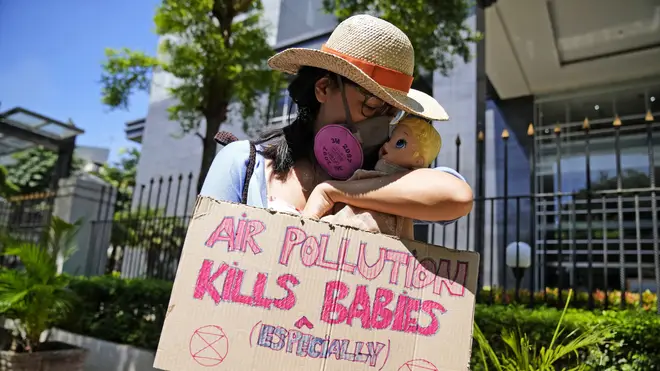
Nick Ferrari 7am - 10am
16 September 2021, 11:04

More than 30 Jakarta residents filed a lawsuit two years ago against Joko Widodo under the Coalition for the Clean Air Initiative.
An Indonesian court has ruled that President Joko Widodo and six other top officials have neglected citizens’ rights to clean air and ordered them to improve the poor air quality in the capital.
A three-judge panel at the Central Jakarta District Court came down on the side of 32 residents who filed a lawsuit two years ago against Mr Widodo and the ministers for environment, health and home affairs, as well as the provincial governors of Jakarta, Banten and West Java.
The judges voted unanimously in favour of the complainants under the Coalition for the Clean Air Initiative.

Presiding judge Saifuddin Zuhri ordered the seven officials to tighten national air quality standards so they are “sufficient to protect human health, the environment and ecosystems, including the health of sensitive populations, based on science and technology”.
“They have been negligent in fulfilling the rights of citizens to a good and healthy environment,” Duta Baskara, a member of the panel, said.
The judges dismissed a part of the lawsuit alleging Mr Widodo had violated human rights.
The complainants, who included activists, public figures, motorists and pollution disease victims, did not ask for financial compensation and instead demanded a more robust supervision and sanction of offenders.
“We hope the defendants would accept their defeat wisely and choose to focus on making efforts to improve air quality conditions rather than doing useless things, such as legal efforts to fight in appeals,” Ayu Eza Tiara, one of the lawyers for the complainants, said.
Jakarta has a population of 10 million, with three times more this number living in its greater metropolitan area.

The severe air pollution in Jakarta stems mostly from vehicle emissions, factories and coal-fired power plants located in the neighbouring provinces of Banten and West Java, according to the Centre on Energy and Clean Air in its 2020 report.
The Climate Action Tracker, an independent scientific analysis organisation, said in its report in April that the Covid-19 pandemic had resulted in a reduction of air pollution in many countries.
But due to the number of coal-fired power plants in the vicinity of major urban centres, the effect was not observed in Indonesia, where South Tangerang, in Jakarta’s metropolitan area, was the world’s 25th most polluted city.
Prone to flooding and rapidly sinking due to uncontrolled ground water extraction, Jakarta is the archetypal Asian mega-city. It has been creaking under its own weight, causing massive pollution to rivers and contaminating the ground water that supplies the city.
Congestion is estimated to cost the economy 6.5 billion US dollars (£5 billion) a year.
Yuyun Ismawati, one of the complainants, said in a statement that if Mr Widodo’s administration ignored the court’s decision, health costs would continue to increase.
The Jakarta administration data released last year showed more than 5.5 million cases of diseases related to air pollution in the city.

The data also said the estimated burden of medical care costs from cases of non-communicable diseases due to air pollution in 2020 could reach 60.8 trillion rupiah (£3 billion).
In a brief submitted in support of the lawsuit, the UN special rapporteur for human rights and the environment said that protecting people from the harmful effects of air pollution was a constitutional and legislative obligation of the Indonesian government, and not an option.
David R Boyd said air pollution was a major problem in Indonesia, causing hundreds of thousands of premature deaths annually.
The court’s verdict has tarnished Mr Widodo’s credibility for improving infrastructure and the environment in Southeast Asia’s largest economy, which has been his signature policy that helped him win a second term in 2019.
Mr Widodo announced shortly after being re-elected that the capital would be moved outside Java, where 57% of the country’s 270 million people are concentrated.
The new site for the capital will be in sparsely populated East Kalimantan province on Borneo island, known for its rainforests and orangutans.